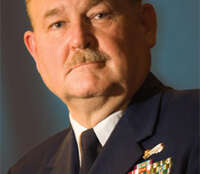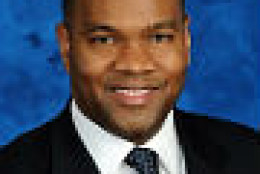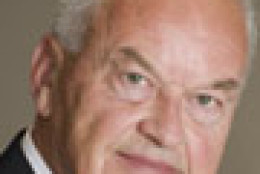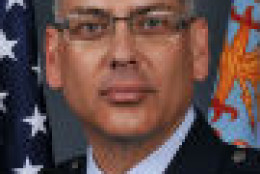Defense Industry
-
The Defense Department wants to change some of its personnel policies for the first time in decades. Acting Undersecretary of Defense for Personnel and Readiness Brad Carson is working on series of recommendations as part of the Pentagon's Force of the Future initiative. Those recommendations are due to Defense Secretary Ash Carter by Aug. 19. Ron Sanders is the vice president of Booz Allen Hamilton and former chief human capital officer for the Office of the Director for National Intelligence. He tells In Depth with Francis Rose about a war gaming exercise he participated in and what the future of the defense workforce might look like.
July 23, 2015 -
The military lacks the resources it needs for nearly every one of its forces. The Marines are running with two-thirds of the number of battalions it has needed in the past to meet its daily operational needs. The Army is losing 40,000 active duty troops in the next two years. And advanced missile defense programs are underfunded and behind schedule. Michaela Dodge is a senior analyst for defense and strategic policy at the Heritage Foundation. She tells In Depth with Francis Rose that DoD and the next administration are in desperate need of a new nuclear game plan.
July 22, 2015 -
Lockheed Martin plans to sell its IT business and acquire helicopter-maker Sikorsky for $9 billion. It's a deal with far-reaching consequences — not just for Lockheed and Sikorsky parent United Technology, but also for the broader defense industrial base. Jesse Holler is a quantitative analyst at Bloomberg Government. He joined Tom Temin on the Federal Drive with more analysis on this deal.
July 22, 2015 -
With a nuclear deal kind of, sort of in place, Iran has been at the forefront of the news lately. But it would be a mistake to take the focus off other places on the radar screen. In particular, China. Peter Singer is a military expert and futurist at the New America Foundation. He joined Tom Temin on the Federal Drive to explain why he believes the Chinese threat is the primary one the United States faces.
July 17, 2015 -
Geographic information systems and intelligence have been converging for a while now. Now nearly all forms of information are available in digital form. The challenge is integrating them. That discipline is called GEO-INT. Former Coast Guard Commandant Thad Allen is now an executive vice president at Booz Allen Hamilton. As a long-time user of both geographic information and intelligence, he joined Tom Temin on the Federal Drive how this data convergence is changing the intelligence landscape and even his own company.
July 10, 2015 Sotera Defense Systems President and CEO Deb Alderson sat with the Women of Washington radio show to discuss her career in defense, both inside the government and as a contractor.
June 03, 2015-
The Air Force and Northrop Grumman have a new deal in place. They're calling it a public-private partnership, and it will enable Northrop Grumman to provide the Air Force with sustainment of future weapon systems. Air Force officials say they hope the deal will improve efficiency, both in negotiations and in implementing future projects. Dr. Chris Jones, the president of Northrop Grumman Technical Services, joined Tom Temin on the Federal Drive with more on the partnership and how it works.
April 01, 2015 -
Cyber déjà vu can happen when the same or similar cyber attacks hit multiple agency networks. But cyber déjà vu can be a good thing if your agency looks at the problem in a different way. That's according to Greg Boison, director of Homeland Cybersecurity at Lockheed Martin. On In Depth with Francis Rose, he shared three ways to take advantage of cyber déjà vu to turn your agency's strategy from reactive to proactive.
March 19, 2015 -
Mark Orndorff, risk management executive & chief information officer for the Defense Information Systems Agency, joins Federal News Radio for a free online chat to discuss his agency's new risk management organization and DoD's evolving approach to cybersecurity.
January 27, 2015 -
The Centers for Medicare and Medicaid Services awarded a five-year, $563 million contract to Accenture to continue its work on Healthcare.gov. It's a high-profile contract in health IT in the federal government, but it's only one contract. Horace Blackman is vice president of health and life sciences at Lockheed Martin. He shared his Top 3 for 2015 on In Depth with Francis Rose. Horace says health IT growth is poised to explode -- and 2015 won't be the end of it, either.
January 05, 2015 -
The Justice Department settled two different cases with large contractors, both of which allegedly overcharged the agencies under the False Claims Act.
December 22, 2014 -
Horace Blackman, vice president of health and life sciences at Lockheed Martin, and Jon Adler, president of Federal Law Enforcement Officers of America, count down the week's top federal stories with Francis Rose.
December 19, 2014 -
Lockheed Martin faces a class-action lawsuit against 120,000 employees for how it handles their 401(k) retirement plans. The case focuses on whether the company's provider made the employees pay higher fees than they needed to and made bad investment decisions. Federal News Radio Senior Correspondent Mike Causey says there isn't a direct connection between the Lockheed Martin case and federal employees. But he told Federal News Radio's Sean McCalley they should pay attention to what happens afterward.
December 16, 2014 -
The Air Force recently completed a test launch of one of its Minuteman 3 intercontinental ballistic missiles. The 5,000 mile flight test was supported by Northrop Grumman, Lockheed Martin and several other contractors. So how does the Air Force maintain readiness of the ICBM fleet? How can it assure the Commander-in-Chief that in the unlikely event of a real launch, the 40-year-old missiles would go where they're supposed to? Maj. Gen. Jack Weinstein, Commander of the 20th Air Force, joined Tom Temin on the Federal Drive to discuss the test flight and the ICMB program.
December 11, 2014













